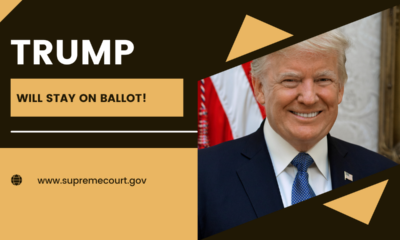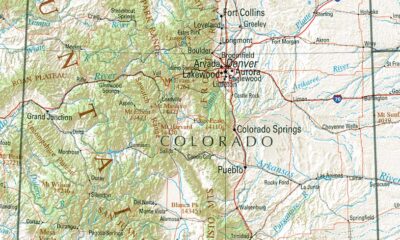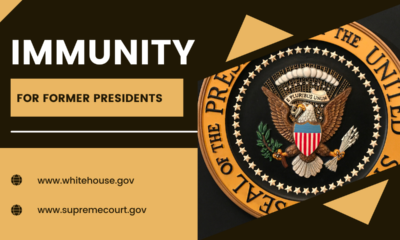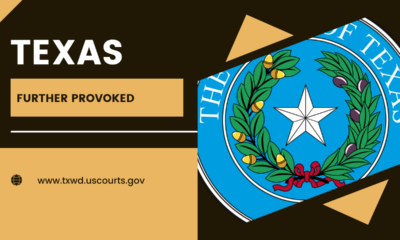Constitution
National emergency – Trump does it
Today President Trump declared a national emergency at the US-Mexican border. He has ample authority and an imperative so to act.
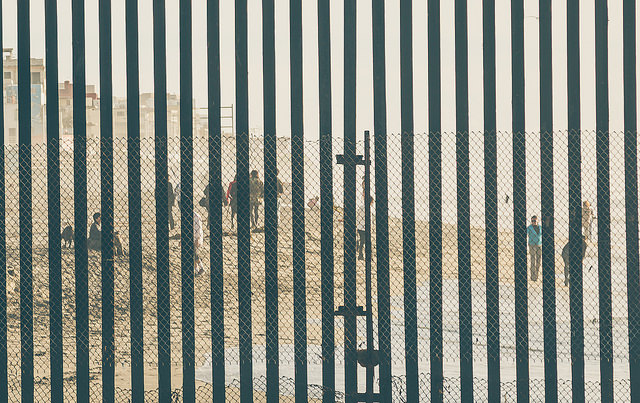
Today President Donald J. Trump made official what he had “teased up” for weeks. Speaking in the Rose Garden this morning, he declared a national emergency on the US-Mexican border. In so doing, he used his authority to redirect moneys the government had not already spent. Several reports suggest Trump gained eight billion dollars for the wall project.
But the President also signed the compromise budget bill that
averts a repeat of the partial shutdown of government. So the
National Parks will stay open, and so will the FAA. Yet many
conservative commentators warn
that the bill has many “poison pills” that could nullify even a
national emergency. Or could they?
Grounds for a national emergency
President Trump, to justify his national emergency declaration, said, quite simply, “We’re seeing an invasion of our country.” He refers to at least two massive caravans of migrants. Many of these migrants have tried to storm the border in recent weeks. Trump also discussed the victims of crimes that illegal immigrants have committed against American citizens. In fact he named several who fell victim to murderous attacks since he took office.
Trump has sounded these themes often, so what he said this morning should surprise no one. The only surprise might have been to learn that he was not bluffing.
The buzz on Twitter and in Internet newsletters has continued without letup since then. Naturally, half the comments approve of his national emergency; the other half do not.
Is a national emergency a valid exercise of executive power?
Article IV Section 4 of the Constitution specifically enjoins the federal government to:
- “Guarantee to every State of the Union a republican form of government,”
- Protect the States against invasion, and
- Protect against “domestic violence” when a State legislature asks for such protection. (A State governor may so request if the legislature cannot assemble.)
Trump, therefore, knew what he was saying when he used the word invasion. The Constitution does not define that word. Traditionally, invasion means a hostile army walking in. But invasion can also mean a crowd of people, even in civilian clothes, trying to storm a border. When at any time anyone tries to enter a territory without invitation or permission, that constitutes an invasion.
Judicial precedent
Ranking Democratic Party Congressional leaders swiftly declared their intent to sue Trump to nullify the national emergency. Trump anticipated this in his Rose Garden speech. He also reminded his listeners that “transgender activists” sued to stop the military from excluding transgender recruits. They “forum shopped” and filed in the Ninth Judicial Circuit. Which circuit has notoriously seen more of its decisions overturned than has any other Circuit. This proved no exception. The Supreme Court refused to enjoin the military from its ban policy. Usually when a judge refuses to enjoin a party temporarily, said judge deems the other party unlikely to win a permanent injunction.
So Trump already expects the Democrats to sue him in some district court in the Ninth Circuit. He also expects the Supreme Court to uphold him in the end.
The Youngstown precedent
Rep. Adam Schiff (D-Calif.) mentioned the so-called Youngstown Decision of 1952 as a precedent against a national emergency. President Harry S. Truman, in that year, seized several steel companies to try to keep them working during a general steel strike. The Supreme Court rebuked him and nullified those orders. (Youngstown Sheet & Tube Co. v. Sawyer.) Justice Hugo Black, writing for the majority, said:
There is no statute that expressly authorizes the President to take possession of property as he did here. Nor is there any act of Congress…from which such a power can be fairly implied.
But President Trump does not propose to seize a business, as Truman did. Nor is such seizure at issue. What is at issue is Presidential discretion in spending funds Congress has already appropriated.
In any event, the National Emergencies Act of 1976 would be at work here. This Act still lets a President declare a national emergency, and re-declare it, with due notice to Congress. In fact, thirty-one national emergencies are now in force and effect! Presidents have been re-declaring these routinely for decades.
Poison pills?
Bobby Eberle, writing at GOPUSA, warns against provisions in the bill that, he believes, no President should sign. In fact, Mr. Eberle describes two kinds of poison pill, that are not equally poisonous. One type concerns certain agencies of the government that Mr. Eberle believes serve no useful purpose. Or worse, these are inimical to liberty. Specifically, he cites the:
- National Endowment for the Arts,
- Internal Revenue Service,
- Environmental Protection Agency, and
- Department of Commerce.
But the President has a problem Mr. Eberle and others should consider. Even a national emergency does not empower a President to de-fund any agency at his own choice. This is not a matter of finesse in negotiations. This is a matter of refusal to negotiate and holding other agencies hostile to these and other similar agencies. Would Mr. Eberle see the FAA shut down, and flights grounded for lack of air traffic control? Ideally, someone should turn air traffic control over to a private company with its own budget and fee structure. Aviation Radio, Incorporated (Arinc) first handled air traffic control before the FAA took that function away from them. But for Arinc or any other private air-traffic control company to take over that function, would take time. It would in fact take too much time, time the country cannot spare with grounded flights.
Poison pills relevant to immigration
Mr. Eberle is on more solid ground when describing another kind of poison pill. According to him, this bill:
- Sets direct limits on construction at the border,
- Further restricts the government’s authority to deport someone, and even (so he says)
- Perversely incentivizes unscrupulous people to traffic in children.
No reliable witness will corroborate Mr. Eberle on the child trafficking charge. But as to the construction limitation, The Washington Examiner had a few more helpful details.
Construction limits
The President, under this bill, may build any physical barrier of a type already standing on the border. This is a steel slat fence that, Trump believes, should be formidable enough.
The President may not build any fence in five specific wildlife areas. This includes the National Butterfly Center. The center directors earlier sued to stop the wall completely. A court refused to enjoin the project. The court held that the plaintiffs had never shown that any federal construction crews had actually trespassed on their refuge.
Finally, the President must “confer and seek…mutual agreement” (i.e., negotiate) with the city fathers of five Texas cities. These are Roma, Rio Grande City, Escobares, La Grulia, and Salineo. But Trump should have an easier time negotiating with these city councils than he ever could have, say, with the city fathers of Austin or San Antonio. And he certainly can do better in these five cities than with House and Senate Democrats!
National emergency for gun control?
Even before Trump declared his national emergency, Speaker Nancy Pelosi threatened that a Democratic President might declare a national emergency “to deal with gun violence.” When she said that, she raised the political stakes tenfold. Now everyone who loves freedom has heard: let another Democrat into the White House, and the weapons collecting will begin. You heard it, from the mare’s mouth, so you have no excuse for failing to act.
Washington State passed several infringements on the right of the people to keep and bear arms. And several sheriffs refuse to enforce these infringements. They find them in violation of the federal and State constitutions. Can anyone reasonably expect these sheriffs to enforce an executive order to call in all guns?
The domestic violence question
In any case, the Speaker seems to suggest a failure of the federal government to protect against domestic violence. The occasional mass shooting in a school, she no doubt thinks, constitutes domestic violence. CNAV would remind the Speaker: the legislature of any State must apply to the federal government before the federal government has any, repeat any, authority to act against domestic violence. No State legislature has ever so applied. Even the Florida legislature did not apply for federal intervention after the Parkland school shooting. Nor did the Connecticut legislature so apply after the Newtown (“Sandy Hook”) shooting. (And this doesn’t even address whether those shootings might have been false-flag pseudo-operations. Might each have involved a provocation of domestic violence to excuse weapons collecting as a measure to quell it?)
Conclusion
In short, the President acted properly today. We do have a national emergency, and one that goes even beyond what the President said. Senator Charles M. Schumer (D-N.Y.) is on record telling a sympathetic audience that “we need the votes” of illegal immigrants. Obviously they want something, and they know the votes of bona fide U.S. citizens won’t get it for them.
But Senator Schumer didn’t
always feel that way! Or at least, he said
he didn’t feel that way. Watch what he said ten years ago
on this very subject.
Today he had the chance to act, and acted in opposition to his position of ten years ago. That’s why we have a national emergency on our southern border. And that’s why Donald Trump had to act as he did today.
Terry A. Hurlbut has been a student of politics, philosophy, and science for more than 35 years. He is a graduate of Yale College and has served as a physician-level laboratory administrator in a 250-bed community hospital. He also is a serious student of the Bible, is conversant in its two primary original languages, and has followed the creation-science movement closely since 1993.



